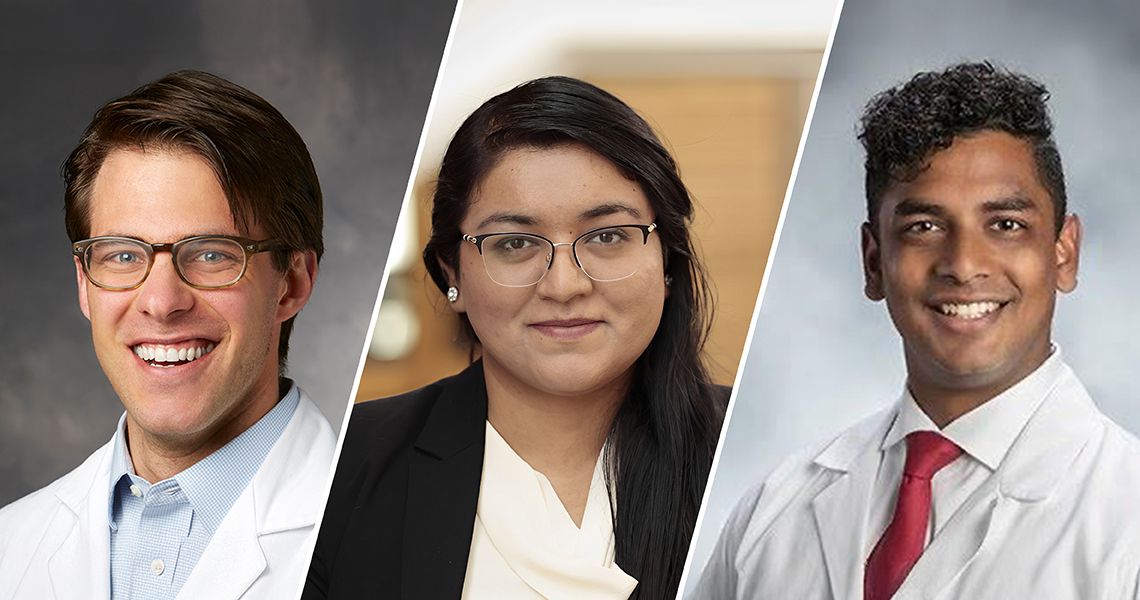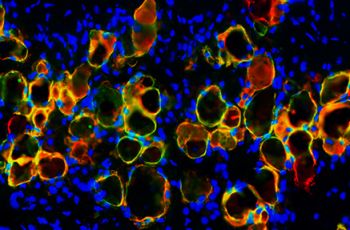The Global Clinical Care Alliance (GCCA) at the George Washington University (GW) School of Medicine and Health Sciences (SMHS) announced the inaugural recipients of the GW Global Health Legacy Fellowship. This new program provides critical support for GW residents and fellows to develop and lead health-focused projects in partnership with international colleagues, building a new generation of leaders dedicated to global health equity.
The inaugural class of fellows includes three clinicians whose work spans neurosurgery, ophthalmology, and emergency medicine: Timothy Singer, MD, MS; Rizul Naithani, DO, MPH; and Jerry Oommen, DO.
“We are thrilled to launch this fellowship and support this extraordinary group of clinician-researchers,” said Gail Rosseau, MD ’85, FACS, clinical professor of neurosurgery and co-chair of the GCCA. “Each of them represents the very best of GW’s commitment to service and innovation, and their projects address some of the most pressing health challenges facing our global community.”
The fellowship provides recipients with funding and administrative support to implement their projects over the course of a year. Each project is designed to be a catalyst for sustained, impactful change, fostering enduring partnerships and leading to tangible improvements in health care delivery.
Timothy Singer, MD, MS: Bridging Neurosurgery and Climate Science
Timothy Singer, a PGY4 neurosurgery resident at GW, has been awarded a fellowship for his project, “Neural Tube Defects in a Changing Climate: Systems, Surgery, and Preparedness in Tanzania.” Singer’s background is uniquely suited for this work. He holds an MD and a Master’s in Environment and Resources from Stanford University and previously completed a residency in pediatrics with a focus on global child health.
Singer seeks to address the epidemiologic link between climate change and conditions like hydrocephalus and spina bifida, particularly in East Africa. His project builds upon his past research and advocacy work at the nexus of climate change and neurosurgical disease. In Tanzania, he will focus on health systems planning and operative capacity building, aiming to improve equitable access to neurosurgical care in low-resource settings.
Singer is widely published in journals including Pediatrics, the Journal of Neurosurgery: Pediatrics, the Lancet Global Health, and BMJ Paediatrics Open, as well as popular outlets including Scientific American and the Houston Chronicle. He is an inaugural resident appointee to the Medical Advisory Board of the Hydrocephalus Association.
Rizul Naithani, DO, MPH: Advancing Glaucoma Care and Quality of Life
Rizul Naithani, a PGY2 ophthalmology resident, will use her fellowship to conduct a comparative evaluation of patient-reported quality of life following different surgical interventions for glaucoma in Southern India. Her project, titled “A Comparative Evaluation of Patient-Reported Quality of Life Using the Indian Visual Function Questionnaire (IND-VFQ-33) Following Combined Minimally Invasive Glaucoma Surgery or Trabeculectomy with Phacoemulsification in Patients with Primary Open-Angle Glaucoma in Southern India,” directly applies her extensive experience in public health and research.
Naithani has a deep understanding of population-level health outcomes. Building on her Master of Public Health from UNC’s Gillings School of Global Public Health, her work will leverage patient-reported data to assess the real-world impact of different surgical approaches, with the goal of enhancing glaucoma care and accessibility in low-resource environments. Beyond her academic pursuits, Naithani is a passionate advocate for global eye health, using her writing and podcasting to raise awareness of gender equity and sustainability in ophthalmology.
Jerry Oommen, DO: Enhancing Emergency Resuscitation in Uganda
Jerry Oommen, DO, received his fellowship in emergency medicine for the project, “Scaling Up Emergency Resuscitation in Uganda: Simulation, POCUS, and Team-Based Training for ReACT Teams.” With a background rooted in academic medicine and international health systems development, Oommen brings a wealth of experience in acute care and training initiatives from his previous work in India and Rwanda.
His project centers on innovative capacity-building models and the integration of point-of-care technologies. By using simulation and point-of-care ultrasound (POCUS), Oommen aims to enhance front-line education and improve clinical decision-making for emergency response teams in Uganda. His scholarly interests also include the use of large language models to support community health workers, positioning his work at the forefront of digital health innovation.
“The quality of the applications we received was outstanding, and our new fellows truly exemplify the collaborative spirit and vision of the GW GCCA,” said Kate Douglass, MD, MPH, co-chair of the GCCA. “We are confident that the work of Dr. Singer, Dr. Naithani, and Dr. Oommen will have an immediate, tangible impact on health outcomes and inspire future generations of GW clinicians to pursue careers in global health and health equity.”
The GW Global Health Legacy Fellowship is supported by a generous group of GW alumni who are committed to expanding the university’s role in addressing health disparities around the world. The GCCA and SMHS look forward to sharing updates on the fellows’ progress and the positive impact of their work in the coming months.



